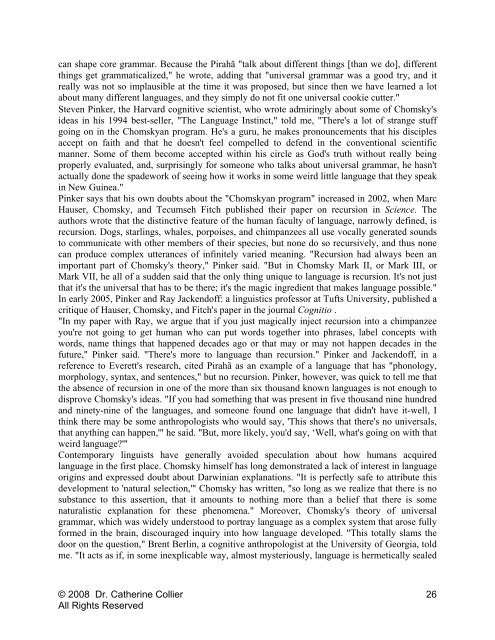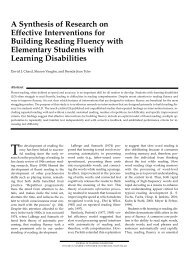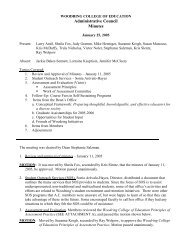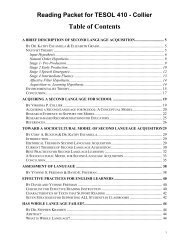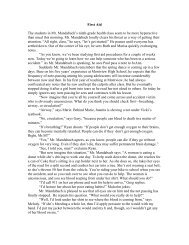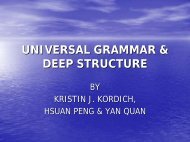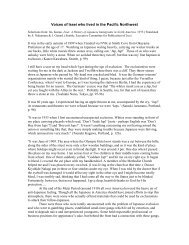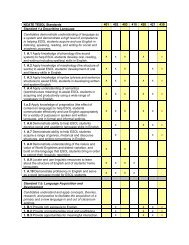can shape core grammar. Because <strong>the</strong> Pirahã "talk about different things [than we do], differentthings get grammaticalized," he wrote, adding that "universal grammar was a good try, and itreally was not so implausible at <strong>the</strong> time it was proposed, but since <strong>the</strong>n we have learned a lotabout many different languages, and <strong>the</strong>y simply do not fit one universal cookie cutter."Steven Pinker, <strong>the</strong> Harvard cognitive scientist, who wrote admiringly about some <strong>of</strong> Chomsky'sideas in his 1994 best-seller, "The Language <strong>In</strong>stinct," told me, "There's a lot <strong>of</strong> strange stuffgoing on in <strong>the</strong> Chomskyan program. He's a guru, he makes pronouncements that his disciplesaccept on faith and that he doesn't feel compelled to defend in <strong>the</strong> conventional scientificmanner. Some <strong>of</strong> <strong>the</strong>m become accepted within his circle as God's truth without really beingproperly evaluated, and, surprisingly for someone who talks about universal grammar, he hasn'tactually done <strong>the</strong> spadework <strong>of</strong> seeing how it works in some weird little language that <strong>the</strong>y speakin New Guinea."Pinker says that his own doubts about <strong>the</strong> "Chomskyan program" increased in 2002, when MarcHauser, Chomsky, and Tecumseh Fitch published <strong>the</strong>ir paper on recursion in Science. Theauthors wrote that <strong>the</strong> distinctive feature <strong>of</strong> <strong>the</strong> human faculty <strong>of</strong> language, narrowly defined, isrecursion. Dogs, starlings, whales, porpoises, and chimpanzees all use vocally generated soundsto communicate with o<strong>the</strong>r members <strong>of</strong> <strong>the</strong>ir species, but none do so recursively, and thus nonecan produce complex utterances <strong>of</strong> infinitely varied meaning. "Recursion had always been animportant part <strong>of</strong> Chomsky's <strong>the</strong>ory," Pinker said. "But in Chomsky Mark II, or Mark III, orMark VII, he all <strong>of</strong> a sudden said that <strong>the</strong> only thing unique to language is recursion. It's not justthat it's <strong>the</strong> universal that has to be <strong>the</strong>re; it's <strong>the</strong> magic ingredient that makes language possible."<strong>In</strong> early 2005, Pinker and Ray Jackend<strong>of</strong>f: a linguistics pr<strong>of</strong>essor at Tufts <strong>Un</strong>iversity, published acritique <strong>of</strong> Hauser, Chomsky, and Fitch's paper in <strong>the</strong> journal Cognitio ."<strong>In</strong> my paper with Ray, we argue that if you just magically inject recursion into a chimpanzeeyou're not going to get human who can put words toge<strong>the</strong>r into phrases, label concepts withwords, name things that happened decades ago or that may or may not happen decades in <strong>the</strong>future," Pinker said. "There's more to language than recursion." Pinker and Jackend<strong>of</strong>f, in areference to Everett's research, c<strong>ited</strong> Pirahã as an example <strong>of</strong> a language that has "phonology,morphology, syntax, and sentences," but no recursion. Pinker, however, was quick to tell me that<strong>the</strong> absence <strong>of</strong> recursion in one <strong>of</strong> <strong>the</strong> more than six thousand known languages is not enough todisprove Chomsky's ideas. "If you had something that was present in five thousand nine hundredand ninety-nine <strong>of</strong> <strong>the</strong> languages, and someone found one language that didn't have it-well, Ithink <strong>the</strong>re may be some anthropologists who would say, 'This shows that <strong>the</strong>re's no universals,that anything can happen,'" he said. "But, more likely, you'd say, ‘Well, what's going on with thatweird language?'"Contemporary linguists have generally avoided speculation about how humans acquiredlanguage in <strong>the</strong> first place. Chomsky himself has long demonstrated a lack <strong>of</strong> interest in languageorigins and expressed doubt about Darwinian explanations. "It is perfectly safe to attribute thisdevelopment to 'natural selection,'" Chomsky has written, "so long as we realize that <strong>the</strong>re is nosubstance to this assertion, that it amounts to nothing more than a belief that <strong>the</strong>re is somenaturalistic explanation for <strong>the</strong>se phenomena." Moreover, Chomsky's <strong>the</strong>ory <strong>of</strong> universalgrammar, which was widely understood to portray language as a complex system that arose fullyformed in <strong>the</strong> brain, discouraged inquiry into how language developed. "This totally slams <strong>the</strong>door on <strong>the</strong> question," Brent Berlin, a cognitive anthropologist at <strong>the</strong> <strong>Un</strong>iversity <strong>of</strong> Georgia, toldme. "It acts as if, in some inexplicable way, almost mysteriously, language is hermetically sealed© 2008 Dr. Ca<strong>the</strong>rine CollierAll Rights Reserved26
from <strong>the</strong> conditions <strong>of</strong> life <strong>of</strong> <strong>the</strong> people who use it to communicate. But this is not some kind <strong>of</strong>an abstract, beautiful, ma<strong>the</strong>matical, symbolic system that is not related to real life."Berlin believes that Pirahã may provide a snapshot <strong>of</strong> language at an earlier stage <strong>of</strong> syntacticdevelopment. 'That's what Dan's work suggests," Berlin said <strong>of</strong> Everett's paper. "The plausiblescenarios that we can imagine are ones that would suggest that early language looks somethinglike <strong>the</strong> kind <strong>of</strong> thing that Pirahã looks like now."Tecumseh Fitch, a tall, patrician man with long, pointed sideburns and a boyishly enthusiasticmanner, owes his unusual first name to his ancestor, <strong>the</strong> Civil War general William TecumsehSherman. Fitch attended Brown <strong>Un</strong>iversity and earned a Ph.D. <strong>the</strong>re. As a biologist with aspecial interest in animalcommunication, Fitch discoveredthat red deer possess a descendedlarynx, an anatomical feature thatscientists had previously believedwas unique to human beings andcentral to <strong>the</strong> development <strong>of</strong> speech.(The descended larynx has sincebeen found in koalas, lions, tigers,jaguars, and leopards.) Fitch, eager tounderstand how humans acquiredlanguage, turned to linguistics andwas surprised to learn that Chomskyhad written little about <strong>the</strong> question.But in 1999 Fitch happened to readan interview that Chomsky had givento Spare Change <strong>News</strong>, a newspaperfor <strong>the</strong> homeless in Cambridge. "Iread it and all <strong>the</strong> stuff he said aboutevolution was almost more than he'sever said in any published thing- andhere it is in Spare Change!" Fitchsaid. "And he just made a few pointsthat made me realize what he'd beengetting at in a more enigmaticfashion in some <strong>of</strong> his previouscomments." Fitch inv<strong>ited</strong> Chomskyto speak to a class that he was coteachingat Harvard on <strong>the</strong> evolution<strong>of</strong> language. Afterward, <strong>the</strong>y talkedfor several hours. A few monthslater, Chomsky agreed to collaboratewith Fitch and Hauser on a paper thatwould attempt to pinpoint <strong>the</strong>features <strong>of</strong> language which areunique to humans and which allowedHomo sapiens to develop language.Portrait <strong>of</strong> Xopí: The Pirahã, Everett says, have no numbers,no fixed terms for colors, & no words for left & right.© 2008 Dr. Ca<strong>the</strong>rine CollierAll Rights Reserved27
- Page 2 and 3: "Those who arrive by age 12 or 13 m
- Page 5: Article I.2 Are Signed Languages "R
- Page 8 and 9: Biological analyses of the status o
- Page 10 and 11: and beyond, speaking and signing ch
- Page 12 and 13: Conclusion: Are Signed Languages Re
- Page 14 and 15: Article I.3 The Interpreter: Has a
- Page 16 and 17: A few weeks earlier, I had called F
- Page 18 and 19: “We struggled even getting to the
- Page 20 and 21: herself by strapping a cassette rec
- Page 22 and 23: In 1998, after nine years as the ch
- Page 24 and 25: momentary burst of excitement that
- Page 28 and 29: The authors compared animal and hum
- Page 30 and 31: monkey moved. He followed it with h
- Page 32 and 33: delight, fear, laughter, and surpri
- Page 34 and 35: Piipaío in a hut: Pirahã huts typ
- Page 36 and 37: LEP students, and equitable organiz
- Page 38 and 39: 4. Second language development crea
- Page 41 and 42: curriculum or "teaching to the test
- Page 43 and 44: portfolio work was scanned and stor
- Page 45 and 46: experiences of many groups of stude
- Page 47 and 48: While not disagreeing that interpre
- Page 49 and 50: sound educational practice, however
- Page 51 and 52: arises from the efforts to abstract
- Page 53 and 54: Article II.2 Cross-Cultural Communi
- Page 55 and 56: males who can serve as positive rol
- Page 57 and 58: Understanding another culture is a
- Page 59 and 60: Pets and AnimalsWhich animals are v
- Page 61 and 62: to teach standard English is reflec
- Page 63 and 64: Asking personal questions of a pers
- Page 65 and 66: Using Cross Cultural Communication
- Page 67 and 68: Why Do Nonstandard English-Speaking
- Page 69 and 70: Before beginning to teach standard
- Page 71 and 72: • Negative attitudes toward low p
- Page 73 and 74: New standardized tests and assessme
- Page 75 and 76: Each of the behaviors listed above
- Page 77 and 78:
Article II.3 Hard Work Hypothesis:
- Page 79 and 80:
each point higher in SES, students
- Page 81 and 82:
This case does not provide strong s
- Page 83 and 84:
Article II.4 Language Acquisition a
- Page 85 and 86:
1992, p. XI). These researchers, wh
- Page 87 and 88:
comprehend a word within a specific
- Page 89 and 90:
more to the truthfulness of the chi
- Page 91 and 92:
This idea of “semilingualism” c
- Page 93 and 94:
Article III.1 A Brief Description o
- Page 95 and 96:
take different lengths of time to c
- Page 97 and 98:
example, should involve the same co
- Page 99 and 100:
As with all stages of BICS acquisit
- Page 101 and 102:
Assessment techniques at stage 3 ca
- Page 103 and 104:
different. Therefore, the social di
- Page 105:
integrative motivation. Basically,
- Page 109 and 110:
(Ellis, 1985; Hakuta, 1986). Howeve
- Page 111 and 112:
that sociocultural processes have o
- Page 113 and 114:
Article III.3 How Children Acquire
- Page 115 and 116:
phonetic units (unique to signed la
- Page 117 and 118:
Article III.4 Toward a Sociocultura
- Page 119 and 120:
emember is that the fundamental goa
- Page 121 and 122:
The best practices models can be th
- Page 123 and 124:
By focusing on the dialectic betwee
- Page 125 and 126:
intergenerational wisdom shared by
- Page 127 and 128:
Daily Realities RecappedThe above v
- Page 129 and 130:
traditions. At a time in our histor
- Page 131 and 132:
We will now look at two examples of
- Page 133 and 134:
Speakers communicate fluently, main
- Page 135 and 136:
question the effects of such attitu
- Page 137 and 138:
Article IV.3 Culture Change: Effect
- Page 139 and 140:
and psychological characteristics o
- Page 141 and 142:
Contraryto what wewere expecting, t
- Page 143 and 144:
Article V.1 Assessment in ESL & Bil
- Page 145 and 146:
vocabulary does the student lack?Is
- Page 147 and 148:
whether they are LEP and to provide
- Page 149 and 150:
Fourth, ESL and bilingual program s
- Page 151 and 152:
competent reader/writer. All versio
- Page 153 and 154:
Table 1Comparison of Recent Accultu
- Page 155 and 156:
unilinear model, which measures the
- Page 157 and 158:
an English-only instructional progr
- Page 159 and 160:
Article V.3 Assessment of English L
- Page 161 and 162:
8. Change answers only for a very g
- Page 163 and 164:
Riles, 1979; Jose P. v Ambac, 1983)
- Page 165 and 166:
proficiency is often underestimated
- Page 167 and 168:
Finally, when second language reade
- Page 169 and 170:
for their decisions, noting issues
- Page 171 and 172:
As mentioned above, when the transi
- Page 173 and 174:
ather than generic adjectives and t
- Page 175 and 176:
their imagined points of view. Ther
- Page 177 and 178:
English texts and demonstrate progr
- Page 179:
using inter-district teams). In the


